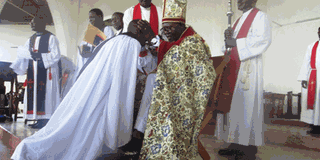West Buganda Diocese raises bar for priests

Ordained. West Buganda Bishop Henry Katumba-Tamale ordains a priest recently. PHOTO BY MOSES MUWULYA
What you need to know:
- Reason. Canon Samuel Mwesigwa says they have tightened their entry qualifications because it was difficult for them to send befitting priests to rural areas.
Masaka. West Buganda Diocese has unveiled a programme where it will only admit and train people who possess diplomas or degrees into priest-hood.
According to Canon Samuel Mwesigwa, the diocesan secretary, they have tightened their entry qualifications just like other dioceses such as Kampala and Namirembe.
West Buganda Diocese issues certificates to priests trained to preach in local languages while the provincial certificates are given to priests trained to preach in English.
“Our challenge as a diocese has been that parishes which have bigger congregations are in rural areas, where majority don’t understand English. In this case, it was difficult for us to give them priests who don’t befit them. So, this kept us training priests who can only preach in local languages and mainly on certificate level, a practice we want to change now, ” Canon Mwesigwa explained during an interview last week.
Despite such challenges, Canon Mwesigwa said the few priests who will be trained to preach in local languages will as well take on English language lessons which wasn’t the case before. He said these will required to have Senior Four qualification.
This new arrangement, according to Canon Mwesigwa, will see Grace Bible College, a theological school at Kako Hill in Masaka, which has been training priests at certificate level, focus on training lay leaders.
“The college has almost phased out training priests on certificate level because we want those with diplomas and degrees, who will be trained by Namugongo Theological College or Uganda Christian University in Mukono,” he noted.
He said the diocese has started posting its priests to the two institutions for further training and they are required to have completed Senior Six, preferably with a professional job.
Some Christians, who spoke to Daily Monitor, welcomed the new arrangement, saying it will help improve the quality of priests at the diocese.
“That was long overdue, we hope to get better priests who can ably express themselves in English and also have some source of income rather than surviving on handouts,” said Mr Emmanuel Mugabi, a Christian at Kijabwemi Church of Uganda.
Ms Christina Namulindwa of All Saints Church in Nyendo Town, said the arrangement will usher in a new breed of priests.
Joining priesthood
When one gets a calling to become a priest, they inform the parish priest and the Christians or the head of laity at the parish who writes a recommendation to the diocesan leaders.
The candidate then sits oral and written interviews.
They are also tasked to explain how they received the call to join priesthood.
When the panel is convinced, the candidate is sent to either Namugongo Theological College to start studies, especially for those on Diploma or Degree levels.
Those at certificate level are taken to the diocesan colleges where they spend three years of study and later ordained priests.


